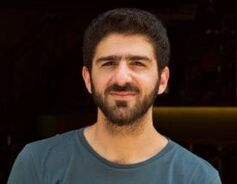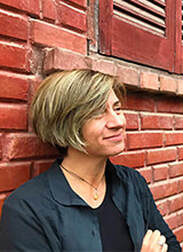The research team
Alexandra Siotou

Alexandra Siotou studied Social Anthropology at the Department of History, Archeology, Social Anthropology of the University of Thessaly and completed postgraduate studies in Cultural Policy, Management and Communication at the Department of Communication, Media and Culture of Panteion University of Social Sciences and Culture. She conducted a doctoral dissertation in social anthropology on the topic: "Love, gender identities and power relations in the context of transnational mobility of immigrants" (University of Thessaly, 2015).
In recent years she has been looking for ways to communicate anthropological knowledge beyond the narrow confines of the academic community and has been experimenting with alternative methods of disseminating and analyzing ethnographic data (museological curation and designing of exhibitions for the Digital Musuem of Greek Immigration in Canada, script writing for a graphic novel, designing an oral history educational program), getting acquainted with digital tools (documentary filmmaking) and participating in experimental ethnographies (Learning from Documenta).
In recent years she has been looking for ways to communicate anthropological knowledge beyond the narrow confines of the academic community and has been experimenting with alternative methods of disseminating and analyzing ethnographic data (museological curation and designing of exhibitions for the Digital Musuem of Greek Immigration in Canada, script writing for a graphic novel, designing an oral history educational program), getting acquainted with digital tools (documentary filmmaking) and participating in experimental ethnographies (Learning from Documenta).
Alexandros Papageorgiou

Alexandros Papageorgiou is a PhD candidate in Social Anthropology at the Department of History, Archeology, Social Anthropology of the University of Thessaly. His dissertation explores modern-day politics of knowledge, specifically "projects" as a technology of governance and subjectification in EU policies for research.
In the past he has worked, among other things, on bodily techniques and practices as a means of cultural immersion, and on the role of digital social networks in modern social movements. His current interests focus on contemporary conditions of anthropological labor and knowledge production, and on anthropology’s position and role in public debate.
In his free time, he works. In his working time, he finds good reasons not to work, or rests from the weight of the thought that he has to work. The rest of the time he is relaxed.
In the past he has worked, among other things, on bodily techniques and practices as a means of cultural immersion, and on the role of digital social networks in modern social movements. His current interests focus on contemporary conditions of anthropological labor and knowledge production, and on anthropology’s position and role in public debate.
In his free time, he works. In his working time, he finds good reasons not to work, or rests from the weight of the thought that he has to work. The rest of the time he is relaxed.
Penelope Papailias

Penelope Papailias is an associate professor of social anthropology at the University of Thessaly where she directs the Εργαστηρίου Κοινωνικής Ανθρωπολογίας and the Pelion Summer Lab for Cultural Theory and Experimental Humanities. She is the associate editor of the World Anthropologies section of the journal American Anthropologist. Her latest collaboration is dëcoloиıze hellάş, a call for re-viewing the place of modern Greece in relation to geographies and genealogies of European colonialism.
Penelope writes on the politics of cultural memory, historical culture and witnessing, visuality and violence, public death and networked mourning from postcolonial, anti-racist and feminist perspectives. She is particularly interested in exploring the possibilities of digital technologies in pedagogy and in expanding the agenda of experimental humanities. Her 2021 article Data-Stories for Post-Ethnography in the journal Entanglements: Experiments in Multimodal Ethnography explores how anthropological experimentation with new media formats might reorient the relation of social and cultural research to broader publics through strategic collaborations with the arts and activism.
Penelope writes on the politics of cultural memory, historical culture and witnessing, visuality and violence, public death and networked mourning from postcolonial, anti-racist and feminist perspectives. She is particularly interested in exploring the possibilities of digital technologies in pedagogy and in expanding the agenda of experimental humanities. Her 2021 article Data-Stories for Post-Ethnography in the journal Entanglements: Experiments in Multimodal Ethnography explores how anthropological experimentation with new media formats might reorient the relation of social and cultural research to broader publics through strategic collaborations with the arts and activism.
